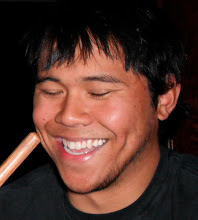
I was just reading through a textbook I bought at a literacy conference three years ago (I’m much cooler than that statement might make me out to sound - FYI.) I quickly had to ask myself: which parts are directly germane to my current classroom and which parts, although interesting, can I skip over?
For those of you that have gone through most any traditional teacher ed program you know it’s a lot of information thrown at you in a short amount of time. So, I ask: what have other new teachers done, if anything, to preserve what they’ve been taught in teacher ed and apply it to there current classrooms? I think it would be an interesting study to survey new teachers and ask them how much of what they learned in teacher ed do they (conciously) apply to there current classroom, and how much of there teaching is adapted from what they learned directly from cooperating teachers and/or current teaching partners and co-workers.
(Above is a look at our class-made rules. With
the right guidance we narrowed 14 rules into
three over-arching ones. I was very proud of
them. Not sure where "no licking" came from.
As new teachers we leave one teaching world (Teacher Education) and enter a new one (In-service teaching). The dream, I think, would be that the teaching practices and pedagogies, the assessments, the management strategies, the curricula, the interpretation and adaptation of curricula, the overall teaching philosophies of higher-order thinking and inquiry classrooms, all those research-backed buzz words we learned in teacher ed would be used and advocated in our current schools. But, I can only assume that is not always the case.
I guess the point I’m advocating for, or rather the dilemma I’m facing at this very moment is that I don’t want to lose that quality teaching and education I got in Teacher Ed. I want to apply it the most effective way I can (because it’s something I believed in very much back than as an undergrad (and that’s what I remember telling myself as an undergrad.) But at some point I have to stop and remind myself how much time I actually have. (There’s that word again: “TIME”). Do I have time to thumb through an old text book or xeroxed article searching for focus lessons on introducing literacy blocks? Or should I save my self the unnecessary stress and utilize the support and knowledge of my teaching partners? Right now, I’m hoping to find a healthy balance of both.
I come back to old textbooks, articles, handouts, and assignments because...I invested a lot of time into them at WWU; I admired and looked up to my professors, and knew they weren’t giving us some “half-assed teaching advice”. It was the real deal. (I don’t mean this to sound like I’m sucking up to my old professors, because what would be the point? I’m graduated!!!) And I wouldn’t feel right dismissing all the work and info I’d saved during those Woodring years just so I could adopt/inherit some teacher short-cuts that would save me time but ultimately be a detriment to, maybe not all, but some students. And that’s just enough to get me back to an old teaching article covered in yellow hi-lighter and use it, perhaps not in an effort to replace a teaching practice but, at least as another perspective, another voice on the teaching team.

I think that you raise a number of interesting issues. It should be pointed out that the fact that you developed class rules with your class is directly connected to your previous learning where someone said, or wrote, something to the effect that "it's a good idea to develop classroom rules with student input." Clearly, that notion stuck. I hear what you are saying about choosing to spend the time to go back and reexamine texts, articles, syllabi, etc. from your teacher education program - no time. Part of that problem is the fact that this is your FIRST classroom. It is not uncommon for new teachers to teach from the text for the first year or two. All of that great stuff that you learned still recides in your memory banks and, while not necessarily vivid, is quietly at work informing your thoughts and actions. I know that when you hear one of your colleagues talk about assessment you immediately think of the importance of collecting pre, formative, and assessment data; thoughts right out of that TWS folder that you have stored in your brain. Or, how about when someone is talking about literacy and you flash on reading and writing centers and differentiated instruction; or when someone suggests using the soccer field as a learning laboratory and "place-based education" comes into your mind. It's all still there just waiting for the right time to appear when you need it.
ReplyDeleteBut, here's the key piece - you need to see yourself as an acquisition specialist. In the stock market the term refers to individuals who buy up valueable assets. My meaning is that from this day forward you need to always look for assets and/or tools that you can utilize with your students. A teacher's life is a never-ending acquisition of resources. We never quit acquiring. Eventually, you'll have an abstract idea of something that you think that you need and BAM!, you'll have it. So, don't worry about losing or not being able to apply all that great stuff that you learned. You're using it everyday without even knowing it.
Oh, thanks MItch! I like that concept of being an acquisition specialist. Also, I sometimes forget how much from Woodring that I've internalized and do without even thinking. Although it was very helpful, I can't say I miss those days of using the Woodring Template lesson plan :)
ReplyDelete